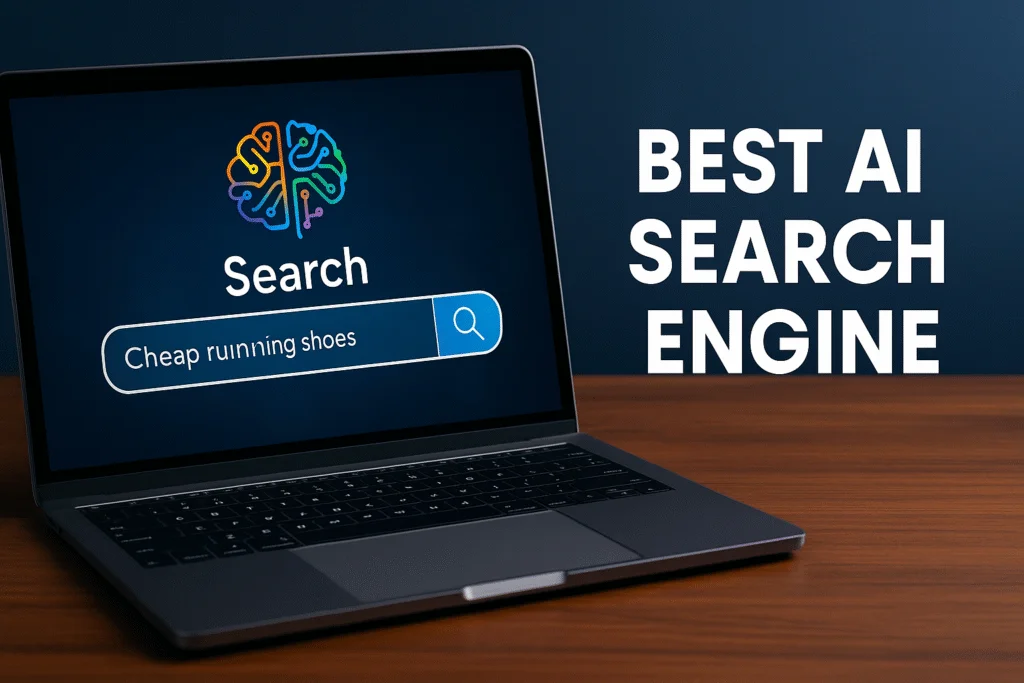In the world of modern eCommerce, speed and relevance are everything. Today’s online shoppers don’t just want quick results they want accurate, personalized, and intelligent ones. This is where AI-powered search engines step in.
AI search engines don’t just match keywords. Instead, they understand context, intent, and user behavior. They learn from interactions, evolve with time, and offer results that feel intuitive. So, when it comes to choosing the best AI search engine for your business, the decision isn’t just about speed it’s about intelligence.

What Is an AI Search Engine?
An AI search engine uses artificial intelligence and machine learning techniques to deliver smarter, more relevant search results. Unlike traditional search engines that rely solely on keyword matching, AI search engines analyze:
User intent
Contextual meaning of queries
Historical behavior
Semantic relationships between terms
They often use techniques such as:
Natural Language Processing (NLP) for understanding queries
Vector search for semantic matching
Ranking algorithms trained on user behavior
Image and voice recognition (in advanced systems)
These engines can continuously improve results by learning from each interaction.
How AI Search Improves eCommerce
Let’s look at how AI search transforms the user experience in online stores:
1. Understanding Complex Queries
Shoppers often use natural language to search. Instead of typing “men’s blue denim L,” a user might search “blue jeans for men size large.” AI search understands such phrasing without requiring exact keyword matches.
2. Synonym and Semantic Matching
AI can connect the dots between “laptop stand” and “notebook riser” — even if product titles don’t mention both. This reduces missed results.
3. Personalized Results
AI search engines adjust rankings based on a user’s previous activity — clicks, purchases, and preferences — making each search session more relevant.
4. Visual and Voice Integration
With AI, users can upload a photo or use voice commands. The engine then identifies and matches relevant products based on visual or audio cues.
5. Better Search Results Over Time
Through machine learning, AI search engines analyze feedback loops (like click-through rates and bounce rates) to refine future results.
Is AI Search Worth It?
Absolutely especially in eCommerce where the difference between a bounce and a sale often comes down to search relevance. Traditional search engines can’t always keep up with:
Multilingual customers
Misspellings
Long-tail queries
Visual search needs
Customer expectations of personalization
If you’re running a store with hundreds or thousands of SKUs, investing in an AI search engine isn’t just beneficial — it’s necessary for growth.
Common AI Search Approaches
AI search engines vary based on the technology stack and depth of intelligence. Here are the most popular methods:
| Technique | Description |
|---|---|
| Keyword + Rules-Based | Simple if/else logic and synonym dictionaries. |
| NLP-Powered Search | Understands context in human language. |
| Vector-Based Search | Uses embeddings to match meaning, not words. |
| Hybrid AI Search | Combines keyword and vector for best results. |
While rule-based systems are fast and simple, they lack flexibility. On the other hand, vector and hybrid systems offer semantic understanding and adaptability.
Are There Better AI Search Engines Available?
Some platforms offer AI search as part of their larger SaaS or enterprise solutions, but they often come with trade-offs:
High costs
Steep learning curves
Limited flexibility for custom ranking or UX tweaks
Complex onboarding or developer dependency
This leads us to a better, easier option tailored for eCommerce: Expertrec.
Why Expertrec Is the Best AI Search Engine for eCommerce
If you’re looking for powerful AI search without the technical burden, Expertrec delivers on every front. Here’s why it stands out:
Vector Search + NLP
Expertrec combines the power of vector embeddings with NLP to understand the true intent behind every query. It doesn’t just rely on word matches — it understands meaning.
No-Code Setup
No developer? No problem. You can implement Expertrec with a simple script — no technical background needed. Setup takes just minutes.
Multilingual Support
Expertrec supports over 30 languages. Whether you’re targeting English, Spanish, German, or Arabic customers, Expertrec adapts your catalog for native relevance.
Fast, Real-Time Indexing
Changes in your product catalog are reflected immediately in search results. Expertrec uses real-time crawlers and APIs to stay up-to-date.
Personalization Engine
The search engine tailors results based on individual user behavior — past searches, purchases, and preferences.
Smart Filters & Facets
Users can easily refine searches through dynamic filters like brand, price, category, and size — all powered by real-time AI.
Mobile-Friendly and Headless-Ready
Expertrec’s solution works perfectly on mobile, and it integrates well with headless platforms for modern site architecture.
Affordable, Scalable, Reliable
Compared to enterprise-level AI search tools, Expertrec offers a more cost-effective yet equally powerful solution for stores of all sizes.
Final Verdict: Why Settle for Less?
If you’re running an eCommerce business and want to improve product discovery, customer satisfaction, and conversion rates an AI search engine isn’t optional anymore. It’s the backbone of a modern, user-centric shopping experience.
And when it comes to balancing performance, simplicity, and intelligence, Expertrec stands out as the best AI search engine for online retailers.
FAQs About the Best AI Search Engine
Expertrec is a leading choice. It combines vector search, NLP, and personalization in a no-code, fast-to-deploy solution.
2. How is AI search different from regular keyword search?
AI search understands context and meaning, not just word matches. It adapts to complex queries, misspellings, and customer intent.
3. Does Expertrec support mobile and multilingual search?
Yes. Expertrec is optimized for mobile users and supports over 30 languages out of the box.
4. How hard is it to implement Expertrec?
It’s simple. Just add a script to your website or connect via plugin. No engineering required.
5. Is vector search included in Expertrec’s engine?
Yes. Expertrec uses vector embeddings to deliver semantically relevant results, even if product titles don’t exactly match the query.
6. Can Expertrec scale for large product catalogs?
Absolutely. It handles catalogs with millions of SKUs while maintaining fast, accurate search performance.
7. How does it personalize results?
Expertrec learns from individual behavior — including past searches, clicks, and purchases — to personalize results dynamically.
8. Does it slow down website speed?
No. Expertrec is built for speed and integrates asynchronously, ensuring your site stays fast.
9. Is there any free trial available?
Yes. Expertrec typically offers a free trial period so you can test features before committing.
10. Where can I learn more or get started?
Visit https://www.expertrec.com to learn more or begin your trial.




